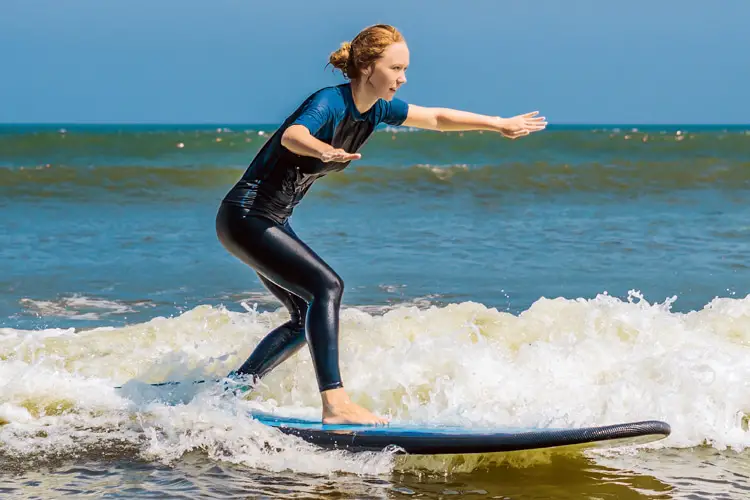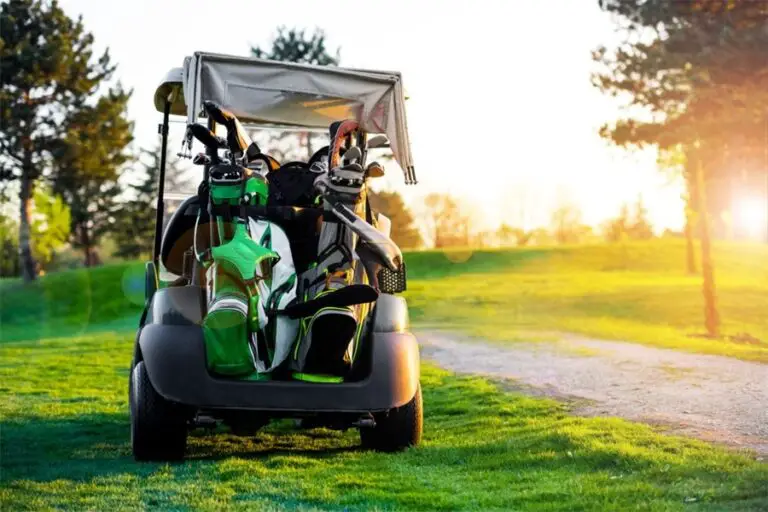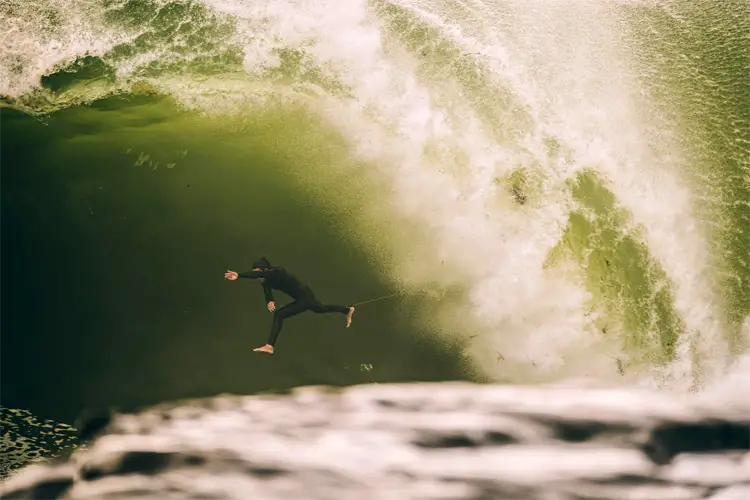How to Practice Snowboarding at Home: Tips for Thriving
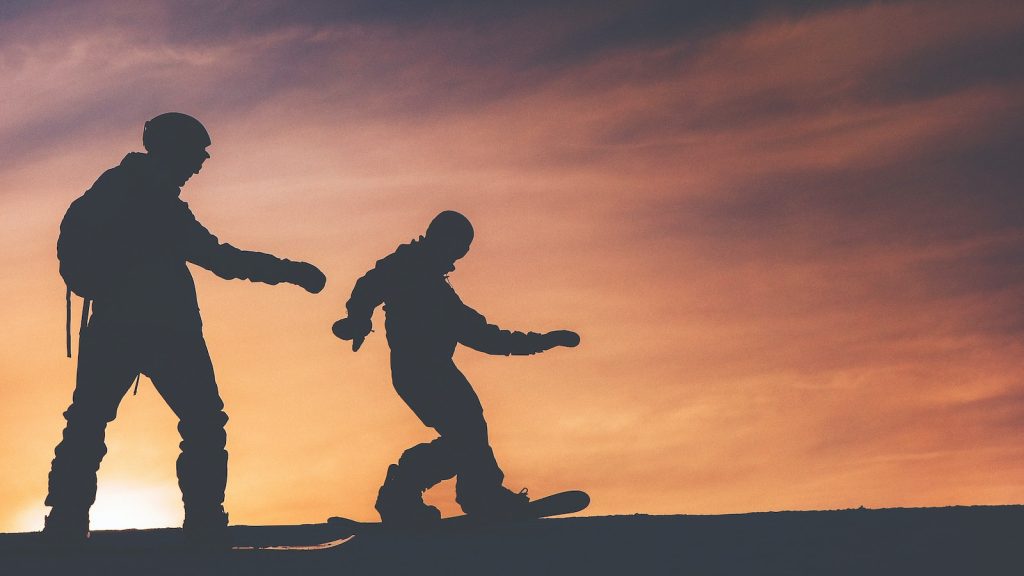
To practice snowboarding at home, set up a balance board and practice balancing and carving motions. Visualization and strengthening exercises can also help improve snowboarding skills. Snowboarders can also work on their stamina and flexibility through specific workouts and yoga routines. Moreover, watching instructional videos and tutorials can offer valuable tips and techniques to refine snowboarding skills at home. Snowboarding enthusiasts can emulate snowboarding movements by practicing on a balance board. This helps in improving stability and control, crucial for snowboarding. Strengthening core muscles is also essential for better control on the snowboard. Visualizing riding down the slopes can also aid in improving technique and form. Furthermore, working on cardio and flexibility will enhance overall snowboarding performance. Accessing online resources for snowboarding tutorials can also offer valuable insights and tips for practicing at home.
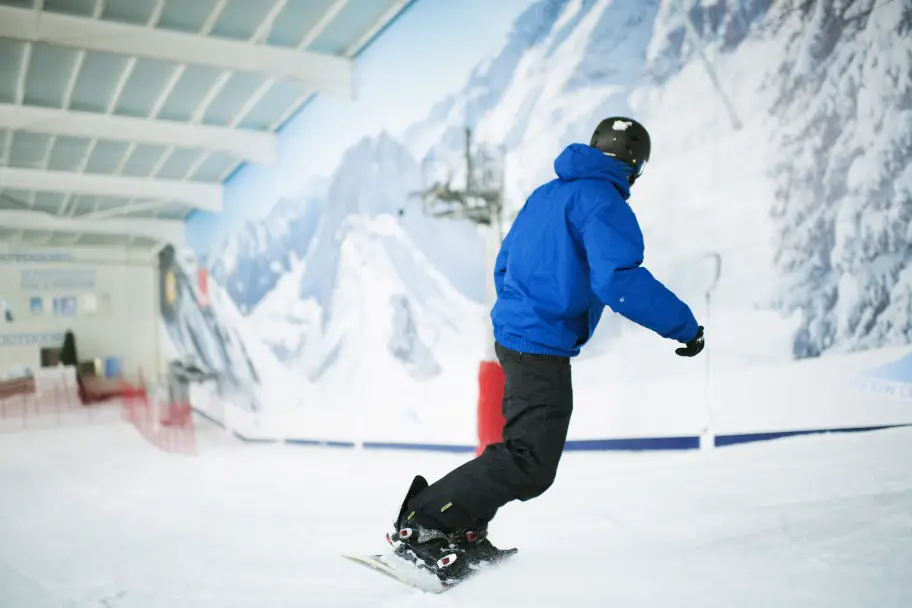
SETTING UP YOUR SPACE
Before you begin your snowboarding journey, it’s essential to set up a space where you can practice safely at home. Whether you have a large backyard or a small basement, the right environment will allow you to hone your snowboarding skills effectively. In this section, we’ll discuss how to choose the right space and create a safe environment for your practice sessions.
CHOOSING THE RIGHT SPACE
To practice snowboarding at home, you need to select an area that provides enough room for movement and mimics the terrain you’ll encounter on the slopes. Consider the following factors when choosing your space:
- Size: Ensure the space is large enough to allow for maneuvers without obstructions. A minimum of 20 feet by 20 feet is recommended, but the more space you have, the better.
- Surface: Ideally, the surface should be smooth and flat. A wooden floor, carpet, or even artificial turf can provide the necessary traction and support.
- Lighting: Good lighting is crucial for visibility and safety. Ensure your space is well-lit, whether it’s natural light from windows or artificial lighting.
CREATING A SAFE ENVIRONMENT
When practicing snowboarding at home, safety should always be the top priority. Here are some essential steps to create a safe environment:
- Clear the area: Remove any potential hazards or obstacles from your practice space. This includes furniture, sharp objects, and loose items that could trip you up.
- Padding: Consider placing padding or mats around the perimeter of your practice area to cushion any falls and reduce the risk of injury.
- Secure equipment: Ensure that your snowboard is in good condition and properly secured before each practice session. Check bindings, straps, and edges to prevent any accidents.
- Protective gear: Always wear appropriate protective gear such as a helmet, knee and elbow pads, and wrist guards to safeguard yourself from potential injuries.
By choosing the right space and creating a safe environment, you can maximize your practice sessions and improve your snowboarding skills right from the comfort of your own home.
INVESTING IN ESSENTIAL GEAR
When it comes to practicing snowboarding at home, investing in essential gear is crucial to help improve your skills and stay safe. By choosing the right equipment, you can create a simulated snowboarding experience that will enhance your balance, control, and muscle memory.
SNOWBOARD SIMULATOR OR BALANCE BOARD
One of the key pieces of essential gear for practicing snowboarding at home is a snowboard simulator or balance board. This equipment helps you mimic the movements and balance required for snowboarding, allowing you to work on your skills and muscle memory in the comfort of your own home. Investing in a quality snowboard simulator or balance board can significantly enhance your snowboarding performance when you hit the slopes.
PROTECTIVE GEAR
Another essential aspect of practicing snowboarding at home is investing in protective gear. Safety should always be a top priority, even when training at home. Make sure to invest in quality protective gear, including a helmet, wrist guards, knee pads, and elbow pads. This gear will provide added protection against potential falls or accidents while practicing your snowboarding skills at home.
LEARNING THE BASICS
Learning the basics is essential for mastering the art of snowboarding, and practicing at home provides an excellent opportunity to focus on foundational skills. By honing your stance and balance, as well as perfecting maneuvering exercises, you can develop a solid foundation that will serve you well on the slopes. Let’s explore these fundamental aspects in more detail:
STANCE AND BALANCE TRAINING
To start, ensuring the correct stance and balance is crucial for snowboarding. A proper stance involves having feet shoulder-width apart and a slight bend in the knees. You can develop your balance by practicing weight shifting from one foot to the other. This helps cultivate the stability needed to carve through turns and navigate various terrains.
PRACTICE EXERCISES FOR MANEUVERS
When it comes to maneuvering on the snowboard, practice makes perfect. Employing exercises such as heel and toe edge rolls can help you get comfortable with shifting your weight and transitioning between edges. Additionally, flatland tricks like ollies and buttering not only enhance your board control but also add an element of fun to your practice sessions. Mastering these maneuvers lays the groundwork for more advanced tricks and techniques down the road.
UTILIZING ONLINE RESOURCES
Learn how to practice snowboarding at home with online resources. Access instructional videos, virtual lessons, and interactive tutorials to perfect your technique and build strength and balance. Utilizing these resources allows you to improve your skills and stay prepared for hitting the slopes.
VIRTUAL SNOWBOARDING CLASSES
ONLINE TUTORIALS AND TIPS
When it comes to learning and improving your snowboarding skills, online resources can be a game-changer. With a variety of virtual snowboarding classes and online tutorials available, you can practice and enhance your snowboarding abilities right from the comfort of your own home.
VIRTUAL SNOWBOARDING CLASSES
Virtual snowboarding classes provide an immersive learning experience, allowing you to receive expert guidance and instruction without stepping foot on a mountain. These classes are conducted through video conferencing platforms and led by experienced snowboarding instructors. Through interactive sessions, you can receive valuable feedback, learn new techniques, and get personalized tips to refine your skills.
ONLINE TUTORIALS AND TIPS
Online tutorials and tips are a treasure trove of knowledge for anyone looking to master snowboarding. Numerous snowboarding experts and professionals share their techniques, tricks, and insights through video tutorials and blog posts. You can find step-by-step instructions, demonstrations, and in-depth explanations of various snowboarding moves and maneuvers. Whether you are a beginner or an advanced rider, these resources offer valuable information to help you progress your snowboarding skills. If you are just starting out, you can find tutorials that cover the fundamentals of snowboarding, from basic stance and balance to initiating turns and stopping techniques. For more experienced riders, there are tutorials on advanced tricks, like rail slides, jumps, and spins, to push your limits and expand your repertoire. Apart from tutorials, you can also find tips and advice from seasoned snowboarders who share their wisdom and experiences. These tips can range from gear selection and maintenance to preparation for different snow conditions. Whether you are looking for advice on staying safe on the slopes or improving your overall performance, online resources have you covered. Moreover, many snowboarding communities and forums exist online, where you can connect with fellow enthusiasts, ask questions, and share experiences. Engaging with these communities can provide additional support, motivation, and encouragement as you pursue your snowboarding journey. In conclusion, utilizing online resources, such as virtual snowboarding classes and online tutorials, can be an excellent way to practice and enhance your snowboarding skills at home. They offer a convenient and accessible avenue for learning and improvement, regardless of your current level of expertise. So why not make the most of these resources and take your snowboarding to new heights?
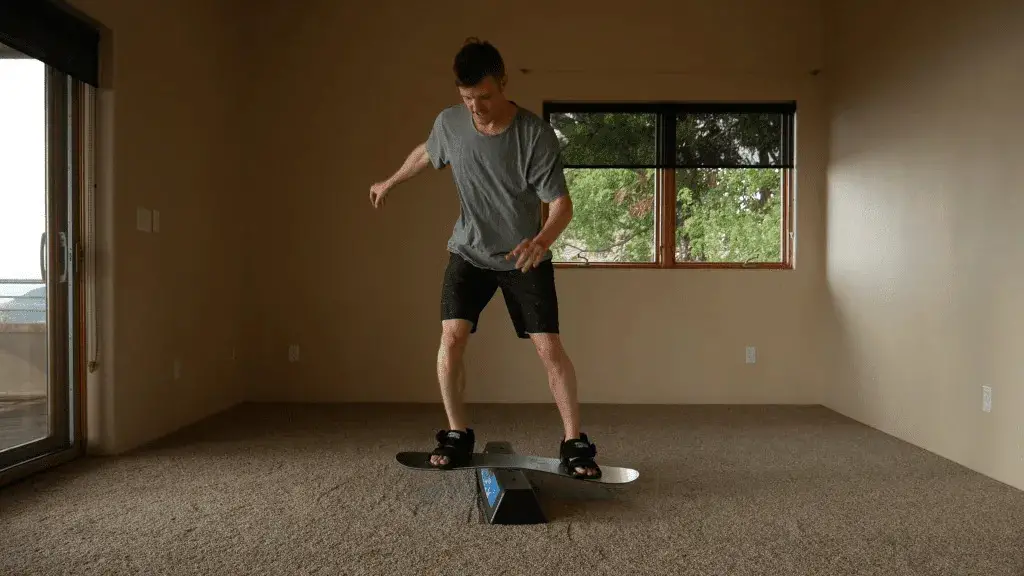
MENTAL AND PHYSICAL CONDITIONING
VISUALIZATION TECHNIQUES
Engage in mental imagery of yourself snowboarding successfully to improve skills.
FITNESS TRAINING FOR SNOWBOARDING
Enhance your physical strength, balance, and agility through specific exercises.
SETTING GOALS AND TRACKING PROGRESS
SETTING ACHIEVEMENT MILESTONES
Break down your snowboarding goals into smaller, achievable milestones. Create milestones for each trick or skill you want to master.
USING TECHNOLOGY FOR TRACKING
Utilize apps or wearable devices to monitor your practice sessions. Record your progress, such as time spent practicing and improvements made.
SAFETY MEASURES
Discover how to practice snowboarding at home safely with these essential measures. Protect yourself from injuries by using proper equipment, creating a designated practice area, and ensuring sufficient space for maneuvers. Follow these steps to enjoy snowboarding even in the comfort of your own home.
1. IMPORTANCE OF SPOTTER OR TRAINER
A spotter or trainer plays a vital role in ensuring your safety while practicing snowboarding at home. Their presence not only provides an extra set of eyes to identify potential hazards but also gives you the peace of mind to focus on improving your skills. A spotter or trainer can give you instant feedback, correct your form, and help you avoid common mistakes that could lead to injuries. With their guidance, you can confidently progress in your snowboarding journey.
2. EMERGENCY PREPAREDNESS
Emergency preparedness is key when it comes to practicing snowboarding at home. Although you may think accidents won’t happen, it’s crucial to be prepared for any unexpected situations. Here are some essential measures to ensure your safety:
A. SAFETY GEAR
Prioritize safety by wearing appropriate gear, including a helmet, goggles, wrist guards, and knee pads. These protective equipment can significantly reduce the risk of injuries in case of falls or collisions.
B. CLEAR THE AREA
Before starting your practice, clear the area of any obstacles or objects that could pose a threat to your safety. Ensure the floor is clean and free from clutter, and verify that any furniture or sharp edges are padded or covered to minimize the risk of accidents.
C. SECURE THE PRACTICE SURFACE
If you have a dedicated space for practicing snowboarding at home, make sure the surface is well-maintained and suitable for the activity. Secure any loose floorboards, uneven surfaces, or slippery areas that might lead to accidents. Additionally, ensure there is adequate space for turns and maneuvers to prevent collisions with walls or furniture.
D. FIRST AID KIT
Always have a fully stocked first aid kit readily available. In case of minor injuries, you can quickly address them and prevent any complications that may arise. Familiarize yourself with basic first aid procedures to handle common snowboarding-related injuries.
E. EMERGENCY CONTACTS
Keep a list of emergency contacts easily accessible in case of a more serious incident. Include the numbers for local emergency services, your family doctor, and anyone else who may need to be notified in case of an emergency. This simple precaution can save precious time during critical moments. By adhering to these safety measures and putting necessary precautions in place, you can practice snowboarding at home with confidence and enjoy the journey of improving your skills.
TRANSITIONING TO THE SLOPES
Transitioning to the slopes is an exhilarating moment for any snowboarder, as it marks the shift from practicing at home to venturing onto the real, snow-covered terrain. While the process may seem daunting, the skills and techniques honed during at-home practice will serve as a solid foundation for a smooth transition to the slopes. In this section, we’ll explore the strategies and tips for seamlessly making the switch.
APPLYING SKILLS LEARNED AT HOME
Upon moving from home practice to the slopes, applying the fundamental skills learned becomes crucial. The balance, posture, and basic maneuvers perfected at home can now be put to the test in a real environment. Ensuring that the techniques are ingrained and instinctive will boost confidence and pave the way for a seamless progression on the slopes.
ADAPTING TO OUTDOOR CONDITIONS
As snowboarding transitions from the indoor setting to outdoor terrain, adapting to the elements is key. Changes in temperature, wind resistance, and snow texture require adjustments in technique. Adapting to these conditions facilitates a smoother transition and helps in maintaining control and balance while snowboarding outdoors.
FREQUENTLY ASKED QUESTIONS OF HOW TO PRACTICE SNOWBOARDING AT HOME
HOW CAN I IMPROVE MY SNOWBOARDING SKILLS AT HOME?
To enhance skills, practice balance on a balance board and work on body conditioning exercises.
WHAT ARE SOME FUN INDOOR SNOWBOARDING TRAINING METHODS?
Engage in activities like yoga for flexibility, high-intensity interval training for endurance, and core workouts.
HOW DOES VISUALIZATION HELP WITH SNOWBOARDING PRACTICE?
Visualization techniques improve muscle memory, enhance focus, and boost confidence during actual snowboarding.
WHAT ARE THE BENEFITS OF PRACTICING SNOWBOARDING AT HOME?
Practicing at home improves technique, builds strength, prepares for the season, and reduces injury risks.
CONCLUSION
Improve your snowboarding skills even when you can’t hit the slopes. By practicing snowboarding at home, you can enhance your balance, strength, and coordination. From setting up an indoor practice area to incorporating exercises that target specific snowboarding skills, these tips will help you stay in shape and ready for your next adventure on the mountain. So, why wait? Start practicing at home and level up your snowboarding game today!


